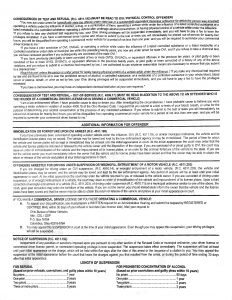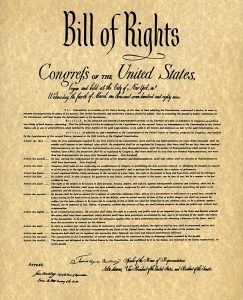 Anyone who has been charged with an OVI / DUI in Ohio has had the pleasure of listening to an officer read several paragraphs from the back of a form provided by the Ohio BMV. This often droll recitation is required by Ohio’s implied consent law, which says that anyone who operates a vehicle in the state implicitly consents to takes a blood/breath/urine test for drugs and/or alcohol if arrested for OVI. An implied consent law similar to Ohio’s was recently found to be unconstitutional by the Georgia Supreme Court.
Anyone who has been charged with an OVI / DUI in Ohio has had the pleasure of listening to an officer read several paragraphs from the back of a form provided by the Ohio BMV. This often droll recitation is required by Ohio’s implied consent law, which says that anyone who operates a vehicle in the state implicitly consents to takes a blood/breath/urine test for drugs and/or alcohol if arrested for OVI. An implied consent law similar to Ohio’s was recently found to be unconstitutional by the Georgia Supreme Court.
Articles Posted in DUI/OVI Constitutional issues
Preview: Third Episode In Trilogy Addressing Blood Tests And Search Warrants
 Just as Hollywood has produced some good movies in trilogies, the United States Supreme Court has produced some good case law in trilogies. The Court addressed the right to confront crime lab analysts with the trinity of Bullcoming, Melendez-Diaz and Williams. On the issue of the need for a warrant to draw blood from a DUI suspect, two-thirds of the triad have been completed: McNeely and Birchfield. The triumvirate is about to be consummated with Mitchell v. Wisconsin.
Just as Hollywood has produced some good movies in trilogies, the United States Supreme Court has produced some good case law in trilogies. The Court addressed the right to confront crime lab analysts with the trinity of Bullcoming, Melendez-Diaz and Williams. On the issue of the need for a warrant to draw blood from a DUI suspect, two-thirds of the triad have been completed: McNeely and Birchfield. The triumvirate is about to be consummated with Mitchell v. Wisconsin.
When Is A Bath Robe Evidence Of DUI / OVI In Ohio?
 We all remember learning in school the Fourth Amendment is the one which requires police to get a warrant to search your house or arrest you. That bullet point is great for helping kids learn the basics of their Constitutional rights; but, in practice, Fourth Amendment law is far more complex and far less certain. The complexity and uncertainty is illustrated by two recent Ohio DUI / OVI cases in which the same court looks at two very similar cases and comes to completely opposite conclusions.
We all remember learning in school the Fourth Amendment is the one which requires police to get a warrant to search your house or arrest you. That bullet point is great for helping kids learn the basics of their Constitutional rights; but, in practice, Fourth Amendment law is far more complex and far less certain. The complexity and uncertainty is illustrated by two recent Ohio DUI / OVI cases in which the same court looks at two very similar cases and comes to completely opposite conclusions.
Constitutional Limitations On Crime Lab Reports In Ohio DUI / OVI Cases

The last post in this blog described how crime lab reports are used in Ohio DUI / OVI cases. In a nutshell: a lab technician issues a report identifying the quantity of alcohol or drugs in a person’s blood or urine, and that report is given to the prosecutor. Ohio legislation requires the prosecutor to provide the report to the defense attorney. Ohio legislation, however, is not the only law impacting the use of these reports. The Constitutions of Ohio and the United States also provide limitations on the use of crime lab reports in Ohio DUI / OVI cases.
Search Of Purse Creates Controversial Court Case

Jamie was driving down the highway with her boyfriend when a police officer stopped Jamie for speeding. It turned out Jamie did not have a driver license, and there was an active warrant for her arrest. The officer put Jamie in the back of his cruiser and placed her under arrest.
The Reasonable Person And Miranda Warnings In Ohio OVI Cases

The reasonable person. Courts make many decisions using the test of what ‘a reasonable person’ would do/think/feel under certain circumstances. Older cases used the ‘reasonable man’ standard, but newer cased have modernized the test with gender neutrality. In the recent case of Cleveland v. Oles, the Ohio Supreme Court concluded a reasonable person stopped by a police officer and placed in a cruiser would not necessarily believe he or she is ‘in custody’, so Miranda warnings are not required.
Arrest Theorem For Ohio DUI/OVI Cases: FST ≠ PC
 Fourth amendment law does not lend itself to mathematical formulas. Rather than using equations to decide Constitutional issues, courts look at the totality of the circumstances and make decisions on a case-by-case basis. This is particularly true when it comes to the issue of whether an officer had probable cause to justify an arrest. However, one theorem illustrated by a recent Ohio OVI case is this: clues on Field Sobriety Tests (FSTs) does not equal Probable Cause (PC).
Fourth amendment law does not lend itself to mathematical formulas. Rather than using equations to decide Constitutional issues, courts look at the totality of the circumstances and make decisions on a case-by-case basis. This is particularly true when it comes to the issue of whether an officer had probable cause to justify an arrest. However, one theorem illustrated by a recent Ohio OVI case is this: clues on Field Sobriety Tests (FSTs) does not equal Probable Cause (PC).
Should We Use The Textalyzer to Combat Distracted Driving In Ohio?

The last entry in this blog discussed the movement to decrease distracted driving in the United States. Using cell phones while driving appears to be increasingly problematic. In response, states are criminalizing the behavior, and groups like the Partnership For Distraction-Free Driving and the Distracted Driving Project are mounting campaigns which encourage drivers to not multi-task while driving. Another idea to combat distracted driving is use of the ‘Textalyzer’.
When Government Breaks Rules For Ohio Administrative License Suspensions

There are few instances when the government can take our property without first holding a hearing. An Ohio Administrative License Suspension (A.L.S.) is one of those instances. If a driver refuses a chemical test or tests ‘over the limit’, an officer takes the driver’s license on-the-spot. Accordingly, to protect drivers’ rights to due process of law, Ohio has rules which must be followed for an A.L.S to be imposed. A recent A.L.S. case in an Ohio Court of Appeals demonstrates what happens when the rules are not followed.
Ohio Appellate Court Holds Officer Did Not Have Probable Cause For OVI Arrest

In Ohio, and throughout the United States, we have a Constitutional right to be free from unreasonable searches and seizures. In Ohio OVI cases, that means an officer can only arrest a suspect if the officer has probable cause to believe the suspect operated a vehicle under the influence of alcohol and/or drugs. In the recent case of State v. Bracken, the Court of Appeals concluded the arrest was not justified. Continue Reading
 Columbus OVI/DUI Attorney Blog
Columbus OVI/DUI Attorney Blog

